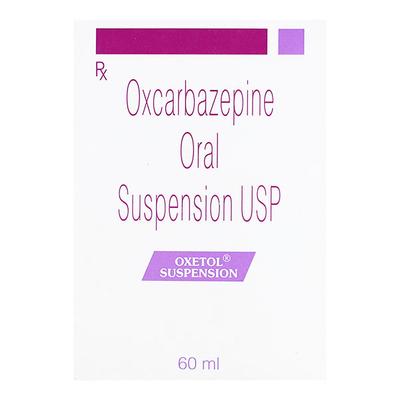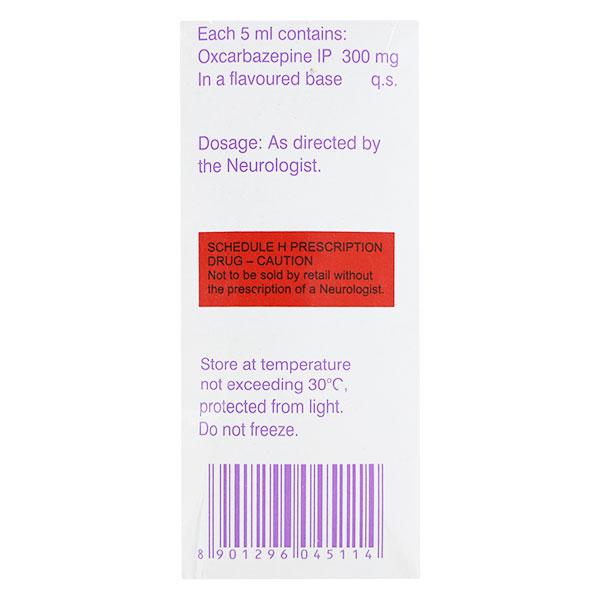

Netmeds First Membership
Quick Links
Introduction About OXETOL SUSPENSION
OXETOL SUSPENSION is used alone or in combination with other anti-epileptic medicines in children and adults to manage partial seizures with or without secondarily generalised tonic-clonic seizures. It contains Oxcarbazepine which belongs to the group of medicines called Anti-epileptics.
Before taking OXETOL SUSPENSION, inform your doctor if you have liver, kidney or heart disease, low levels of sodium in the blood or have intolerance to certain sugars or hereditary fructose intolerance. Prior to management with the medicine, your doctor may want you to take several blood tests to understand your existing condition. It should be used with caution in pregnant women only if clearly advised by the doctor and it is not recommended for use in breastfeeding women. Patients taking OXETOL SUSPENSION may have self-harming thoughts. If at any time you have these thoughts, immediately consult your doctor.
OXETOL SUSPENSION can be used in children above 6 years of age and your child’s doctor may monitor the thyroid function of the child before and during management with this medicine. It should be used with caution in elderly patients (aged 65 years and above), especially in patients with kidney impairment. The most common side effects are tiredness, headache, dizziness, nausea, vomiting, diarrhoea and stomach pain. Consult your doctor if any of the side effects worsen.
Uses Of OXETOL SUSPENSION
It is used alone or in combination with other anti-epileptic medicines:
- To manage partial seizures with or without secondarily generalized tonic-clonic seizures
How OXETOL SUSPENSION Works
OXETOL SUSPENSION works by keeping the brain’s hyperactive nerve cells under control (by binding to sodium channels) thus reducing the chances and frequency of seizures.
How to use OXETOL SUSPENSION
- Take the medicine as advised by your physician
- Shake well before use. Use a measuring cup or a spoon to properly measure the dose
- Your doctor will decide the correct dose and duration for you depending upon your age, body weight and disease condition
- Do not stop taking the medicine unless your doctor advises you to stop
Side Effects Of OXETOL SUSPENSION
Common side effects of OXETOL SUSPENSION:
- tiredness, weakness
- headache, dizziness, drowsiness
- memory disturbances
- impaired concentration, loss of interest
- constipation, diarrhoea, stomach pain
- balance disturbance
Stop taking OXETOL SUSPENSION and contact your doctor immediately if you experience any of the following side effects:
- underactive thyroid (signs include weight gain, tiredness, hair loss, muscle weakness and feeling cold)
- anaphylactic reactions and angioedema (signs include swelling of the lips, eyelids, face, throat or mouth, leading to trouble breathing, speaking or swallowing)
- low blood sodium levels (signs include lethargy, confusion, muscle twitching or significant worsening of fits)
- decrease in the number of platelets or blood cells (signs include tiredness, shortness of breath when exercising, paleness, headache, chills, dizziness, frequent infections causing fever, sore throat, mouth ulcers, bleeding or bruising more easily than usual, nose bleeds, reddish or purplish patches or unexplained blotches on the skin)
Warning & Precautions
Pregnancy
Monitoring requiredOXETOL SUSPENSION should be used with caution in pregnant women only if considered clearly necessary as there may be a risk to your baby.
Breastfeeding
ContraindicatedOXETOL SUSPENSION is not recommended for use in breastfeeding women as it may pass through breast milk.
Driving and Using Machines
Use with CautionDo not drive or operate any machines while taking OXETOL SUSPENSION as it may cause dizziness, sleepiness, muscle coordination problems, eye problems like double or blurred vision or depressed level of consciousness.
Alcohol
Consult your doctorAvoid consumption of alcohol while taking OXETOL SUSPENSION as it may increase the sedative effect of this medicine.
Kidney
Use with CautionOXETOL SUSPENSION should be taken with caution in patients with kidney disease.
Liver
Use with CautionOXETOL SUSPENSION should be taken with caution in patients with serious liver disease.
Allergy
ContraindicatedDo not take OXETOL SUSPENSION if you are allergic to Oxcarbazepine or any other ingredients of this medicine.
Heart Disease
Use with CautionOXETOL SUSPENSION should be taken with caution in patients with heart disease (causing shortness of breath or swelling of the feet or legs due to fluid build-up).
Use In Pediatrics
Consult your doctorOXETOL SUSPENSION can be used in children above 6 years of age. Your child’s doctor may monitor the thyroid function of the child before and during management with this medicine and may adjust the dose depending on the child’s body weight.
Use In Geriatrics
Use with CautionOXETOL SUSPENSION should be used with caution in elderly patients (aged 65 years and above), especially in patients with kidney impairment.
Others
Before taking OXETOL SUSPENSION, inform your doctor if you:
- have low levels of sodium in the blood (hyponatremia)
- have intolerance to certain sugars or hereditary fructose intolerance
Interactions
A. Drug-Drug interactions:
Before taking the medicine, inform your doctor if you are taking any of the following medicines:
- anticonvulsants (Ex. phenobarbital, phenytoin, carbamazepine, lamotrigine, valproic acid)
- contraceptives (Ex. ethinyl estradiol, desogestrel)
- antipsychotics (Ex. lithium, phenelzine, moclobemide)
- diuretics (Ex. furosemide, hydrochlorothiazide)
- anti-diabetic agents (Ex. desmopressin)
- non-steroidal anti-inflammatory agents (Ex. indomethacin, ibuprofen)
- immunosuppressants (Ex. ciclosporin, tacrolimus)
- anti-TB agents (Ex. rifampicin)
Overdosage:
If you or anyone else accidentally takes too much of OXETOL SUSPENSION, consult your doctor immediately or visit the nearby hospital. Overdosage symptoms are drowsiness, dizziness, problems with coordination or involuntary movement of the eyes, muscular twitching or significant worsening of fits, headache, nausea, vomiting, increased uncontrolled movements, lethargy, double or blurred vision, narrowing of the black part of the eye, tiredness, short and shallow breathing, irregular heartbeat, shaking, headache, uncontrollable movements of mouth, tongue and limbs, aggression, agitation, confusion and low blood pressure.
Synopsis
| Drug | : | Oxcarbazepine |
| Pharmacological Category | : | Anti-convulsant |
| Therapeutic Indication | : | Partial seizures with or without secondarily generalised tonic-clonic seizures |
| Dosage Forms | : | Tablet, Syrup, Suspension |
More Information
FAQs About OXETOL SUSPENSION
Q: Can I continue taking my oral contraceptive pill with OXETOL SUSPENSION?
A: No, OXETOL SUSPENSION may stop hormonal contraceptives from working properly. Your doctor may advise you to use different or extra (non-hormonal) method of contraception while taking the medicine.
Q: What if I forget to take a dose of OXETOL SUSPENSION?
A: If you forget to take a dose of OXETOL SUSPENSION, take it as soon as you remember. However, omit the missed dose if it is almost time for the next dose.
Q: Can OXETOL SUSPENSION be used during pregnancy?
A: OXETOL SUSPENSION should be used with caution in pregnant women only if clearly advised by the doctor as there may be a risk to your baby. Do not stop taking this medicine during pregnancy without the advice of the doctor.
Q: Does OXETOL SUSPENSION affect my ability to drive or perform any activities?
A: Do not drive or operate any machines while taking the medicine as it may cause dizziness, sleepiness, muscle coordination problems, eye problems like double or blurred vision or depressed level of consciousness. You can resume your activities once if you are normal again.
Q: Can OXETOL SUSPENSION be used in patients with liver disease?
A: OXETOL SUSPENSION should be used with caution in patients with serious liver disease. Your doctor may adjust the dose based on liver function tests.
References
1. Barbara G. Wells, Joseph T. DiPiro, Terry L. Shwinghammer, Cecily V. DiPiro. Epilepsy. Pharmacotherapy Handbook. Ninth edition. 2015. Page-518.
2. S M Grant, D Faulds. Oxcarbazepine. A review of its pharmacology and therapeutic potential in epilepsy, trigeminal neuralgia and affective disorders. NIH. National Center for Biotechnology Information.Pubmed.gov. June 1992. [Accessed on 4th June 2022] click here
3. Charles V. Preuss, Gagandeep Randhawa, Tom Joshua P. Wy, Abdolreza Saadabadi. Oxcarbazepine. NIH. National Library of Medicine. National Center for Biotechnology Information. May 2022. [Accessed on 4th June 2022] click here
4. Novartis Pharmaceuticals UK Limited. Health Products Regulatory Authority (HPRA). [Revised in April 2022] [Accessed on 4th June 2022] click here












